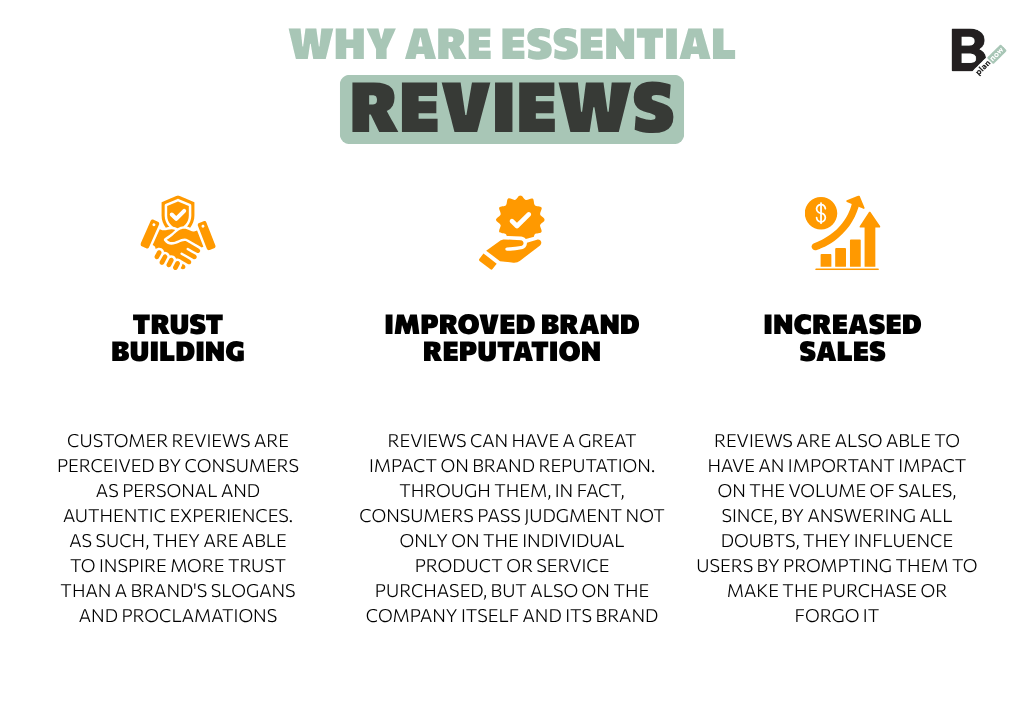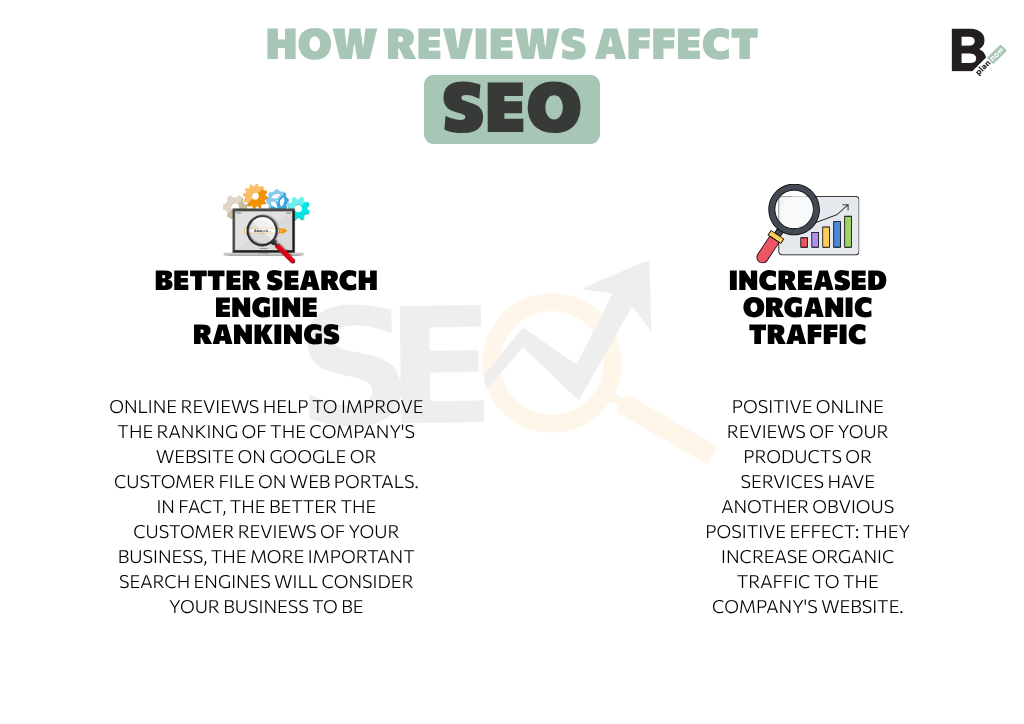Customer reviews, nowadays, play a decisive role in improving a brand’s reputation and increasing its sales. But why are they important? And, more importantly, what are the most effective tools and strategies to manage and make the most of them? These-and many other questions-will be answered in this guide.
Why reviews are critical for business
To understand the real power of reviews for business purposes, one need only quote a famous quote by Chris Anderson:
“Your brand is not what you say, but what Google says about you.”
These days, after all, most consumers, before proceeding to purchase a product or service, search the search engine (but not only) for the opinions of other users.

Building trust
Customer reviews are perceived by consumers as personal and authentic experiences. As such, they are able to inspire more trust than a brand’s slogans and proclamations.
If you want to sell online (as well as offline) you need to be clear about this, because building trust in your brand must also – and especially – come through your customers’ comments and opinions.
Although there are many consumers who monitor others’ opinions about products or services, the number of people who spontaneously leave a review after making a purchase is still relatively low. So you often have to encourage customers to do so. We will see how in a moment.
Improving brand reputation
Reviews, as already mentioned, can have a great impact on Brand Reputation. Through them, in fact, consumers make a judgment not only about the individual product or service purchased, but also about the company itself and its brand. Managing the reputation of your company or startup, therefore, must also inevitably go through review management.
Increased sales
In more concrete terms, reviews are also able to have an important impact on the volume of sales, since, by answering all doubts, they influence users by prompting them to make the purchase or forgo it.
How reviews affect SEO and online visibility
We have already mentioned earlier the fundamental role that Google, or – better said – the reviews on it, play in building trust towards the brand. Let us now see how reviews affect SEO optimization and online visibility.

Better search engine rankings
Online reviews help to improve the ranking of the company’s website on Google or customer file on web portals. The better the customer reviews of your business, in fact, the more important search engines will consider your business.
Increased organic traffic
Positive online reviews of your products or services have another obvious positive effect: they increase organic traffic to your company’s website.
Effective strategies for requesting positive reviews
In general, a user is highly more likely to write a review when he or she has something to complain about than in an opposite scenario in which he or she is expected to comment positively on a product or service.
For this reason, precisely because of the importance of reviews, it is crucial to put some strategies in place to prompt users to leave a positive review.
The most direct way, of course, is to explicitly ask the customer to leave a review. You could take the opportunity of positive feedback left spontaneously by the customer, but also send — regardless — a direct communication a few days after the purchase of the product or service. Time, in this case, is decisive: you have to choose the right time to invite the customer to leave the review because you have to give him time to assess his degree of satisfaction, but you cannot wait too long to avoid losing his attention. In general, the time varies according to the industry in which the company operates and the type of product or service.
To entice customers to leave reviews, alongside more traditional strategies, such as the promise of a coupon for future purchases, extra points in the loyalty program or free samples of your products, you could focus on “gamification” to stimulate (through “game”, i.e., play) your customers to leave a review. Many companies already do this. Tripadvisor, for example, issues badges to users who write reviews, who gain more prominence on the platform precisely based on the badges they collect.
Managing negative reviews: turning criticism into opportunity
As already pointed out, users are generally more likely to leave negative reviews than positive ones. Therefore, it is important to know how to handle criticism so that you can turn it into an opportunity.
Timely and professional response
Absolutely critical, first and foremost, is to respond promptly to reviews, especially negative ones.
Equally important is to maintain a neutral tone, without losing your temper or attacking the user who left a negative comment. The priority should be to emphasize a willingness to resolve the problem raised and, if necessary, provide clarity where this is merely the result of a misunderstanding or a mistake (of the company or the customer himself).
Ask for more details about the purchase, respond point by point to the objections raised in the review, and offer the user the opportunity to continue the conversation in private, making available to him or her the most appropriate figure to provide the assistance he or she needs.
Whether you are wrong or right, always maintain a professional tone. Users are used to reading even-and, in some cases, especially-negative reviews and pay particular attention to how brands handle them. Don’t delete (assuming you can) negative reviews, but respond to them accurately and circumstantially, so that you frame the customer’s experience in a context that doesn’t risk hurting your brand’s reputation.
The Role of Reviews in Startups
In the digital age, reviews have taken on a major role for startups as well. In this regard, there is one particular aspect to consider. We will discuss it in the next section.
Building reputation from the very beginning
Unlike an established company, for a startup to get known by as many people as possible from the very beginning is crucial.
Publishing positive user reviews, even on sites specifically created to host consumer opinions (such as, for example, Trustpilot), can give a decisive boost to a startup’s growth, helping it increase its visibility and attract new customers (and investors), supporting efforts related to SEO-side optimization.
Tools and platforms for managing reviews
It’s time to know now, in detail, the tools and platforms you can use to manage user reviews.
Google Business Profile
You certainly know about Google, which is the number one search engine in the world. Perhaps, however, you may not know exactly what Google Business Profile is.
It is an online form dedicated to businesses that is provided free of charge by Google. Inside, business owners can enter business information and photos, but this space also hosts customer reviews and much more.
Industry Platforms
As mentioned earlier, there are specific sites created to host user reviews. One such site is the aforementioned Trustpilot, a platform that connects businesses and consumers precisely through their feedback.
For local businesses, another useful site in terms of reviews is Yelp, while for those in the travel and hospitality industry, the “must” is obviously Tripdavisor.
Last but certainly not least is Amazon, a reference point for consumers when it comes to knowing the opinions of other users before buying physical products.
Review management software
You may not know that there is software created specifically to help manage reviews. Specifically, platforms of this type make it easier to monitor users’ opinions about the company posted on various sites and social media, collect reviews, and interact more quickly and conveniently with consumers.
Integrate reviews into your marketing
Having reached this point, you will be more clear than ever about the importance of reviews when it comes to improving a brand’s reputation and increasing sales.
There remains, however, one more aspect to explore: companies-and, as we have seen, startups first and foremost-must absolutely integrate reviews into their marketing strategy.
Sharing on social media
Reviews bring other reviews: that’s why your social media marketing strategy should include the ability to share your customers’ reviews, interact with them and collect them within albums or other highly visible spaces within social platforms.
Incorporation into the website
Reviews (or better yet, video reviews) should also be incorporated within the website so that they can be an inspiration to other users. If you run an eCommerce business, remember to incorporate customer reviews within your product sheets.
Use in advertising campaigns
Finally, you can decide to use reviews even in the context of corporate advertising, that is, within your advertising campaigns. An example of this is what Amazon did, which in 2017 ran a promotional campaign based entirely on real user reviews of its products. To this day it is still remembered as one of the best commercials made by the company founded by Jeff Bezos.
Do you want to read all the articles related to the stage your startup is in?


